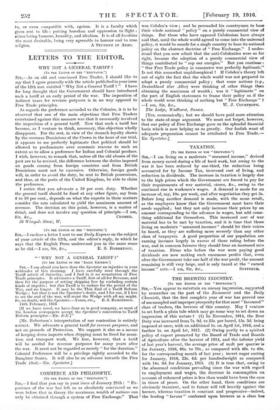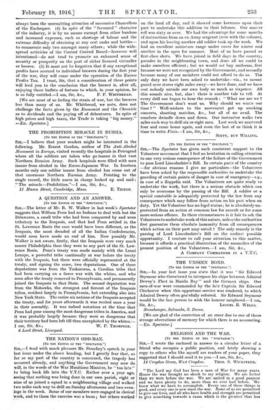THE BREWING INDUSTRY.
[To THE EDITOR OF THE " SPECTATOR:1 Sra,—You appear to entertain an uneasy impression, supported by researches on the part of the Economist and the Daily Chronicle, that the first complete year of war has proved one of unexampled and improper prosperity for that most "favoured" class of traders, the brewers of this country. May I venture to set forth a plain tale which may go some way to set down an impression of -this nature ? (1) In November,- 1914, the Beer Duty was increased from 7s. 9d. to 25s. per barrel, 15s. 3d. being imposed at once, with an additional Is. on April 1st, 1916, and a further Is. on April 1st, 1917. (2) Owing partly to a spirited policy of export promoted by the Board of Trade and Boards of Agriculture after the harvest of 1914, and the inferior yield of last year's harvest, the average price of malt per quarter is for January, 1916, 68s. to 70s., as compared with 46s. to 49s. for the corresponding month of last year ; invert sugar costing for January, 1916, 23s. 6d. per hundredweight as compared with 14s. 9d. for January, 1915. (3) It is true that, owing to the abnormal conditions prevailing since the war with regard to employment and wages, the decrees() in consumption on account of enhanced prices is less than would have been the case in times of peace. On the other hand, these conditions are obviously transient, and in future will tell heavily against the brewer, whereas taxation is constant and progressive—indeed, the leading " favour " conferred upon brewers as a class has
always been the unremitting attention of successive Chancellors of the Exchequer. (4) In spite of the " favoured " character of the industry, it is by no means exempt from other burdens and increased expenses, such as shortage of labour and the extreme difficulty of obtaining at any cost casks and bottles— to enumerate only two amongst many others ; while the wide- spread activities of the Central Control Board—however well intentioned—do not tend to promote an enhanced sense of security or prosperity on the part of either licensed victualler or brewer. (5) It must not be forgotten that if any exceptional profits have accrued to individual brewers during the first year of the war, they will come under the operation of the Excess Profits Tax. I trust, Sir, that a consideration of these points will lead you to the conclusion that the brewer is, after all, enjoying those buffets of fortune to which, in your opinion, he is so fully entitled.—I am, Sir, &c., F. P. WurrinoteD.
[We are most of us feeling the strain of war, but the brewers less than many of us. Mr. Whitbread, we note, does not challenge the facts given by the Economist and the Chronicle as to dividends and the paying off of debentures. In spite of high prices and high taxes, the Trade is taking "big money." —ED. Spectator.]



































 Previous page
Previous page